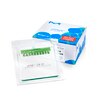MABN864 Sigma-AldrichAnti-Potassium Channel Kir4.1 Antibody, clone 9C9.2
Anti-Potassium Channel Kir4.1 Antibody, clone 9C9.2 is an antibody against Potassium Channel Kir4.1 for use in Western Blotting, Immunohistochemistry (Paraffin).
More>> Anti-Potassium Channel Kir4.1 Antibody, clone 9C9.2 is an antibody against Potassium Channel Kir4.1 for use in Western Blotting, Immunohistochemistry (Paraffin). Less<<Recommended Products
Overview
| Replacement Information |
|---|
Key Spec Table
| Species Reactivity | Key Applications | Host | Format | Antibody Type |
|---|---|---|---|---|
| H, M, R | WB, IH(P) | M | Purified | Monoclonal Antibody |
| References |
|---|
| Product Information | |
|---|---|
| Format | Purified |
| HS Code | 3002 15 90 |
| Presentation | Purified mouse monoclonal IgMκ antibody in PBS with 0.05% sodium azide. |
| Quality Level | MQ100 |
| Physicochemical Information |
|---|
| Dimensions |
|---|
| Materials Information |
|---|
| Toxicological Information |
|---|
| Safety Information according to GHS |
|---|
| Safety Information |
|---|
| Storage and Shipping Information | |
|---|---|
| Storage Conditions | Stable for 1 year at 2-8°C from date of receipt. |
| Packaging Information | |
|---|---|
| Material Size | 100 μg |
| Transport Information |
|---|
| Supplemental Information |
|---|
| Specifications |
|---|
| Global Trade Item Number | |
|---|---|
| Catalogue Number | GTIN |
| MABN864 | 04055977332216 |
Documentation
Anti-Potassium Channel Kir4.1 Antibody, clone 9C9.2 SDS
| Title |
|---|















